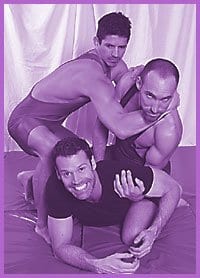Call it a pissing match, a game of chicken or a game of one-upmanship. Whatever you call it, the latest twist in the rancorous battle between Federation Of Gay Games (FGG) and Rendez-Vous Montreal will see more competition between the two hosting cities than among the athletes each is trying to woo.
See, Rendez-Vous Montreal is hosting an international sporting event for gay, lesbian, bi and trans people between Jul 29 and Aug 5, 2006. Chicago is hosting the Gay Games, an international sporting event for gay, lesbian, bi and trans people, between Jul 15 and Jul 22, 2006.
If you noticed that these two very similar events are just two weeks apart, you get a point.
“Good luck to Chicago,” says Jean-Yves Duthel, public relations officer for Rendez-Vous Montreal 2006. “We’re two and a half years ahead. We have commitments from teams around the world. We have 42 percent of our budget in the bank today…. We don’t understand why the group in Chicago is doing this. I’m not sure they’ll finish the year. Good luck to them.”
In 2001, Montreal won the right to host the 2006 Gay Games. The relationship between Montreal and the FGG was rocky – disputes over projected budgets and financial control – coming to an end last November when Montreal decided to go it alone. The FGG reopened the bidding process and on Mar 2, Chicago was announced the victor over Los Angeles.
“I think they [Montreal] can get their numbers and we can get our numbers and there doesn’t have to be a bitter and negative campaign,” says Kevin Boyer, member of victorious Chicago Games Inc board. “There are a lot of different events. The Gay Games have the tradition, the legacy and the inspiration since the Games began in 1982.”
Montreal is projecting 14,000 athletes and 2,000 artists, while Chicago’s bid is based on 12,000 participants, workable with as few as 8,000. The last two Gay Games events, in far-flung Sydney, Australia (2002), and Amsterdam (1998) attracted more than 12,000 participants each.
While some estimate there will be a 10 to 15 percent overlap in participants in Chicago and Montreal, most athletes will only have the time and money to attend one.
Each has its own pros and cons. Montreal has had more time to organize and market and has already major sponsors and supporters in place. As well, international participants might be put off Chicago by US immigration policies that require fingerprints and mug shots, as well as HIV screening at the border.
On Chicago’s side is the Gay Games brand, a large American participant base and Montreal’s tendency to sling mud.
“Montreal can do well, but it depends on how it conducts itself,” says Shamey Cramer, who led the losing Los Angeles bid. “If Montreal keeps making swipes, they’re not going to get the support. Gay and lesbian people are sick of bitchy comments.”
Boyer says the FGG wanted bids for 2006, not 2007. FGG spokesperson Jake Stafford says that everyone was aware of Rendez-Vous Montreal’s dates, but says the choice wasn’t a deliberate fuck-you.
“In North America, there’s a very compressed time frame. There’s really only six to eight weeks to choose from,” says Stafford.
“That’s bullshit,” says Duthel.
Cramer wishes Chicago well, but has doubts about their winning bid. He says the registration fees are steep (starting at $160, but going up to $250) and seem aimed at the urban gay men he thinks Montreal is also gunning for.
“The FGG is going to have to explain a few things to the athletes of the world to justify why they chose this proposal,” says Cramer.


 Why you can trust Xtra
Why you can trust Xtra


